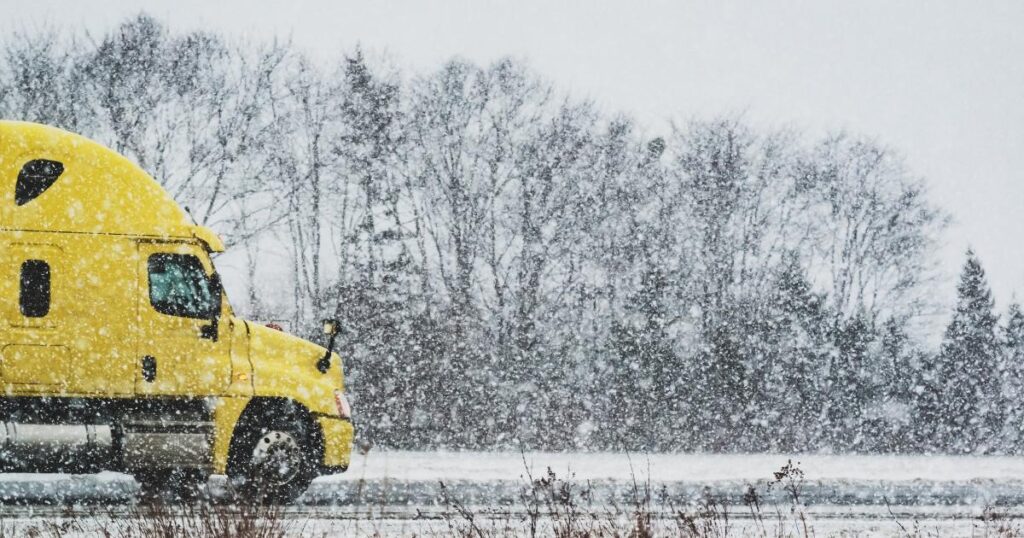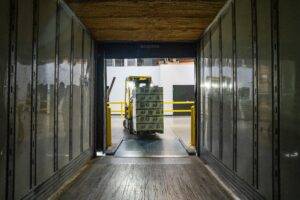The logistics and transportation sector has come a long way from its early days. In this respect, the widespread adoption of cold storage containers for perishable foods represents the most significant change. In the modern era of globalized trade and transportation, refrigeration systems have become indispensable. Using this method adds substantial costs to global transportation and business.
Drivers could only transport perishable goods during the winter months before the invention of temperature-controlled containers. Technology has come a long way for refrigerated shipping, allowing for year-round operation. Even with improved technological tools, bad weather remains one of the biggest obstacles for companies in the shipping industry. The unpredictability and variety of extreme weather events, such as floods, storms, and freezing temperatures, are what cause the most disruption to the supply chain.
Is your company prepared to deal with the effects of natural disasters? You can make a better assessment of the issue thanks to your forethought. As a result, it will be much simpler to lessen the impact of winter’s harshness.
In this post, we’ll discuss the challenges faced by the supply chain during the winter season and how hard it is for drivers to deal with those challenges to timely deliver the products to customers. Let’s get started.
Winter Challenges Faced By Supply Chain
Understanding the most typical problems that arise in the supply chain during the winter months is essential for being ready for supply chain challenges. The cold weather that causes freight transit and delivery delays are the primary distinction between the winter supply chain and supply chain procedures during other seasons.
When it comes to supply chain management, winter presents its own set of distinct issues for organizations. If you and your company have made specific preparations for the winter season, then it should go smoothly for your supply chain.
Listed below are some of the most pressing supply issues that arise in the winter.
1. Adverse Climate Conditions
The largest hazard to the supply chain throughout the winter is the risk of extreme weather. Though certain locations endure more extreme winter weather than others, frigid temperatures and snowy conditions affect businesses across the country when the supply chain is countrywide.
Winter weather has significant effects on supply systems, including:
- Road restrictions due to snow and ice delay freight trucks
- Bad weather prevents cargo planes from flying
- Delays in international cargo shipping, either air, ground, or sea, caused by meteorological conditions in other nations
.
- Power interruptions that affect distribution centers and warehouses
The supply chain can negatively impact the winter mentioned above weather problems, including delays, accidents, and safety risks.
2. Demand Spikes During the Holidays
The increased customer demand that occurs before the holidays and in the following months is another challenge for the supply chain throughout the winter. This demand continues even after the holidays have passed. During the holiday season, there is an increase in need across the country in general, as well as an increase in demand for specialized products that have particular requirements for storage and delivery.
Your ability to effectively predict the type of demand that your business may anticipate during this time of year will determine whether or not the Christmas supply chain your company implements will be successful. You can estimate the demand over the holidays with the assistance of forecasting tools by looking at data from the past.
3. Greater Anticipated Waiting Time
The severe winter conditions and increased demand that come with the holiday season have knock-on consequences throughout the supply chain. Consequently, it is of the utmost importance to prepare ahead and think about how the winter can impact the delivery schedule. During the winter, it takes longer for vehicles to transport goods between the warehouse and the delivery terminals.
As a result, many businesses report greater lead times during this time of year. Even while it is difficult to predict exactly how winter weather and demand will affect the supply chain from year to year, setting the expectation of extended lead times can help lessen the likelihood of these delays.
4. Warehousing Shortages
Warehouse space can become scarce during the run-up to the holidays as increased consumer demand pushes inventory levels dangerously low. Companies that fail to anticipate rising consumer demand sometimes find themselves rushing to locate suitable storage space in advance of a surge in product orders.
Also, when key transportation routes are impacted by winter weather, warehouse turnover rates decrease, which causes a delay of products that would otherwise have been out for delivery. This causes a delay in the distribution process and increases the overall cost of the supply chain as well as the time it takes to get products to customers.
5. Price Hikes in the Transportation Industry
The supply chain disruption caused by winter weather can drive up operational costs, particularly those associated with trucks and shipping. When the demand from customers begins to exceed the supply of a good or service, prices all along the supply chain begin to rise. Cost increases throughout the supply chain affect every aspect of logistics, from the vehicles used for transportation to the containers used for storage.
It is because the additional costs that are connected with a lagging supply chain are passed on to the consumer it is imperative that a budget be created that takes into account the implications of the winter supply chain.
To Sum Up
Blizzards, freezing rain, and bone-chilling cold can all cause havoc on the logistics of getting goods to stores and customers. Transport routes being shut down, cargo being damaged, and unexpected power outages are just a few ways cold weather may disrupt supply chains. But you don’t need to worry because I-Way logistics are here to help you. We have planned ahead for the winter and developed solutions to deal with the icy conditions. By anticipating the impact of winter weather on supply chains, our specialists can minimize costly delays and maximize the efficiency with which orders are filled.




